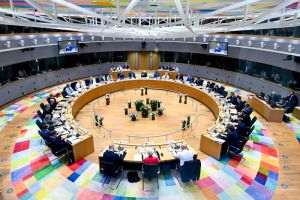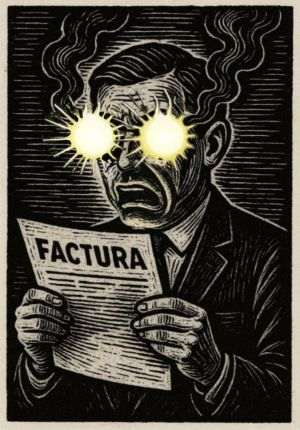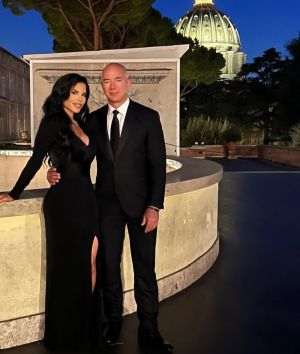At first glance, the US-Russian negotiations that took place yesterday in Riyadh seem to resemble those of the Wild West. Donald Trump, posing as the new sheriff of the world, wants to reach an agreement with the international criminal (if we take into account the arrest warrant issued by the International Criminal Court) Vladimir Putin. In fact, the US president seems to be looking to conclude a deal with his counterpart in the Kremlin. Trump is ready to formalize Russia's territorial conquests in Ukraine, to enshrine them and to remove Putin from international anathema, on the condition that the Russian president does not interfere with what Donald considers to be the priority interests of the US, interests that include the exploitation of the resources of Greenland, the Panama Canal, the terraforming of the Gaza Strip and whatever else the new White House Administration wants to do. The transaction between the two heads of state seems bizarre. Because Trump is not giving Putin anything, but he is not taking anything away from what the Kremlin leader has already achieved.
That is why Donald Trump avoided inviting the European Union and China to the table for talks in the peace talks in Ukraine, because a deal like the one he is negotiating with Putin could not have taken place in the presence of the other two global powers. So he chose to negotiate separately with each. Moreover, he sent Vice President JD Vance to the negotiations with the EU, because it seems that Trump considers that no European leader is worthy of negotiating directly with him, except for Vladimir Putin, whom he is going to meet soon. He spoke with Emmanuel Macron on the phone 22 minutes before the informal summit in a restricted format that took place on Tuesday in Paris, and later during the meeting, there was less discussion about peace in Ukraine, and more about supporting this state and about European security and defense. The peace issue is probably becoming a taboo subject for EU leaders, because the issue was already seized upon by Donald Trump long before he returned to the White House. The only European voice that vehemently expressed his opinion on the issue of peace was German Chancellor Olaf Scholz, who declared that the EU rejects a peace imposed on Ukraine, instead of a negotiated, lasting and sustainable one.
Even the Kremlin expressed favorable feelings about the European Union, announcing yesterday, through Dmitry Peskov, that Russia does not oppose Ukraine joining the bloc, but only joining NATO. Like Trump, Vladimir Putin probably believes that the EU is not an adversary worth taking into account, that would cause him problems, or that European leaders are not capable of confronting it without the support of the US. This was acknowledged on Tuesday in Paris by Polish Prime Minister Donald Tusk, former President of the European Council, who stated that at the moment the European Union is not capable of countering the military force of the Russian Federation.
This is the global political picture in which yesterday what can be called in diplomatic terms the normalization of Russian-American relations took place after the cold snap between the two states following the invasion of Ukraine by the Russian Federation on February 24, 2022.
• Ceasefire and presidential elections - conditions for peace negotiations in Ukraine
The US and Russia will establish a consultation mechanism to eliminate tensions and promote cooperation between the two states, the two delegations that met in Riyadh, Saudi Arabia, established yesterday. Following the discussion, it was also decided to create joint high-level expert teams that will work for a quick resolution of the Russian-Ukrainian conflict, the Russian daily Kommersant reports. However, Secretary of State Marco Rubio said that the European Union must be involved in the negotiations, given the sanctions imposed on Russia by the community bloc.
Regarding the conflict in Ukraine, according to the American television station Fox News, the two delegations that met in Riyadh, led by Marco Rubio and Sergey Lavrov, proposed a framework that would involve a ceasefire, as well as presidential elections in Ukraine - given that President Zelensky's mandate expired in May 2024 - followed by the signing of a peace agreement. Mike Waltz, Donald Trump's national security adviser, said that the US wants a definitive solution to the Russian-Ukrainian conflict, rejecting the possibility of a prolonged war in Europe. "An endless war, transformed into a life-stealing machine, is unacceptable to Donald Trump," Waltz said.
The American television station CNN reports that Sergei Lavrov, the Russian Foreign Minister, said: "I think we had a useful discussion. We not only listened to each other, we also heard each other." The quoted source mentions that Tammy Bruce, the spokeswoman for the he State Department confirmed that Marco Rubio agreed to "lay the foundation for cooperation" with Russia on various issues, and to establish "high-level teams" to begin working on a way to end the conflict in Ukraine.
Fox News also states that several foreign diplomatic sources claim that forcing Ukraine to organize presidential elections could be a key part of a peace agreement. Both the US and Russia believe that Ukrainian President Volodymyr Zelensky has little chance of being re-elected as president, diplomatic sources say for the quoted American television station.
Moreover, other diplomats quoted by Fox News claim that "there is a risk that in the presidential elections in Ukraine either a politician close to the Kremlin will be elected, or another candidate who is more flexible and more prepared to negotiate and be willing to make concessions in talks with Vladimir Putin."
• US and Russia restore staff at embassies in Moscow and Washington
Regarding what was agreed in Riyadh, President Zelensky declared yesterday during an official visit to Ankara, Turkey, that his country would never accept the peace terms negotiated by the US and Russia without the involvement of Ukraine. He specified that, in the absence of Ukrainian representatives at the negotiations, any agreement between Russia and the US refers only to bilateral relations between the two states and not to the resolution of the armed conflict.
An important decision taken following the negotiations was the restoration of staff at the Russian and US embassies in Moscow and Washington. US Secretary of State Marco Rubio described this measure as "the first step on a long and difficult path".
The Russian representative, Kirill Dmitriev, said that the delegations addressed the future of economic cooperation, including global energy prices. Russian media - Izvestia and Kommersant - state that American officials were surprised to learn that the economic losses of American companies, as a result of the withdrawal from the Russian market, are estimated at $300 billion.
Regarding a possible meeting between Vladimir Putin and Donald Trump, Yuri Ushakov - the advisor to the Russian president - stated that it is unlikely that the presidents of the US and the Russian Federation will meet by the end of this month, but he specified that both sides will work to create the necessary conditions for such a meeting.












































